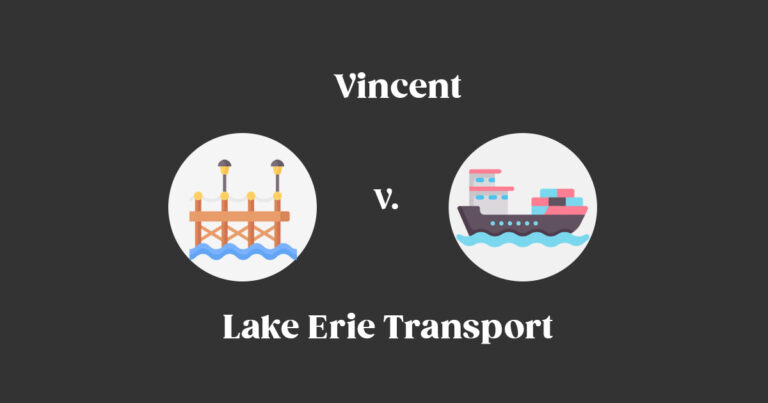Quick Summary
Lake Erie Transportation Co. (the defendant) was found liable for causing damage to (the plaintiff) R.C. Vincent’s shipping dock during a raging storm. The defendant had tied its boat to the dock to unload cargo but was forced to stay put due to the worsening weather. This inflicted heavy damages to the dock; therefore, the plaintiff sued to recover the damages.
The issue presented in the court was whether the defendant was liable for the damages made to the dock due to his ship being tied in the storm.
The court awarded Vincent $500 in compensation. The state supreme court upheld the decision, stating that the defendant intentionally used Vincent’s property to protect its own valuable assets, and private necessity does not excuse one from responsibility.
Rule of Law
An individual cannot be held responsible for damages caused to another person’s property during an unavoidable and accidental occurrence. However, if the individual intentionally causes harm to the property to protect their own assets, they are obligated to compensate the affected party for the damages caused.
Facts of the Case
R.C. Vincent and others (plaintiffs) owned a shipping dock in Duluth. Lake Erie Transportation Co. (defendant) anchored its boat to Vincent’s dock to unload the cargo. While the goods were being unloaded, a storm started forming and worsened. After the cargo was unloaded, the storm became so fierce that navigating became almost impossible. Due to the storm, the defendant kept their ship tied to the dock for private necessity.
The dock was damaged by the force of the defendant’s ship banging into it. The ship would have made its way out to sea if it had been allowed to get untied. The trial court established that the defendant’s action did not constitute trespass since common law grants possessory rights to those who require the use of other people’s property to save lives. The jury awarded the Plaintiff $500 in compensation for the dock damage. Defendant appealed in court.
Issue
Is the defendant responsible for the damages that were done to the property of Plaintiff?
Holding and Conclusion
Yes.
The state supreme court upheld the lower court’s decision on appeal, reasoning that the plaintiffs were entitled to compensation because the damage to their dock was not caused by an act of God, which would have dismissed the defendant from liability, but rather by the defendant’s prudent intention to use plaintiffs’ property to preserve its own more valuable property.
A person’s private need to cause harm to another’s property does not exempt them from responsibility for such damage.
Reasoning and Analysis
The court reasoned that Lake Erie Transportation is liable for Vincent’s losses even though he is not accountable for trespassing since they had a private necessity and were on Vincent’s property for defensive purposes, and since Lake Erie Transportation took drastic precautions to keep the boat safe, it was found to be accountable for its lack of responsibility.
In his dissenting decision, Lewis argued that dock owners endanger themselves and their boats by leaving them attached to the dock during a storm. Therefore, the accident leading to the damage was unavoidable, and the boat’s skipper, who behaved reasonably, should not be held responsible.
Relevant FAQs of this case
How can a person's actions during a natural calamity impact their liability for damages caused to others' property?
Deliberate actions that put others’ property in harm’s way, or prioritize one’s own property over others, may result in liability for damages. Careless or reckless behavior may also lead to liability; however, reasonable measures to protect one’s property may exempt them from responsibility. The extent of liability varies based on circumstances and applicable laws.
What evidence is required to prove liability for damages caused by a natural calamity?
To prove liability for damages caused by a natural calamity, the evidence must demonstrate that the actions of the person in question were a direct cause of the damage and that those actions were either deliberate or careless. This can include witness statements, physical evidence, and expert testimony. The applicable laws and specific circumstances of the event will also play a role in determining the evidence needed to prove liability.
How does insurance play a role in compensating damages caused by a natural disaster?
Insurance can play a significant role in compensating damages caused by a natural disaster by covering the cost of repairs or replacing damaged property.
Individuals or businesses may often have insurance policies specifically designed to provide coverage for damages resulting from natural disasters. When a disaster occurs, the policyholder can file a claim with their insurance company and receive compensation for their losses if the claim is approved.
This can help alleviate the financial burden of recovering from a natural disaster. However, the extent of coverage and the amount of compensation received may depend on the specific terms and conditions of the insurance policy.
References
Was this case brief helpful?
